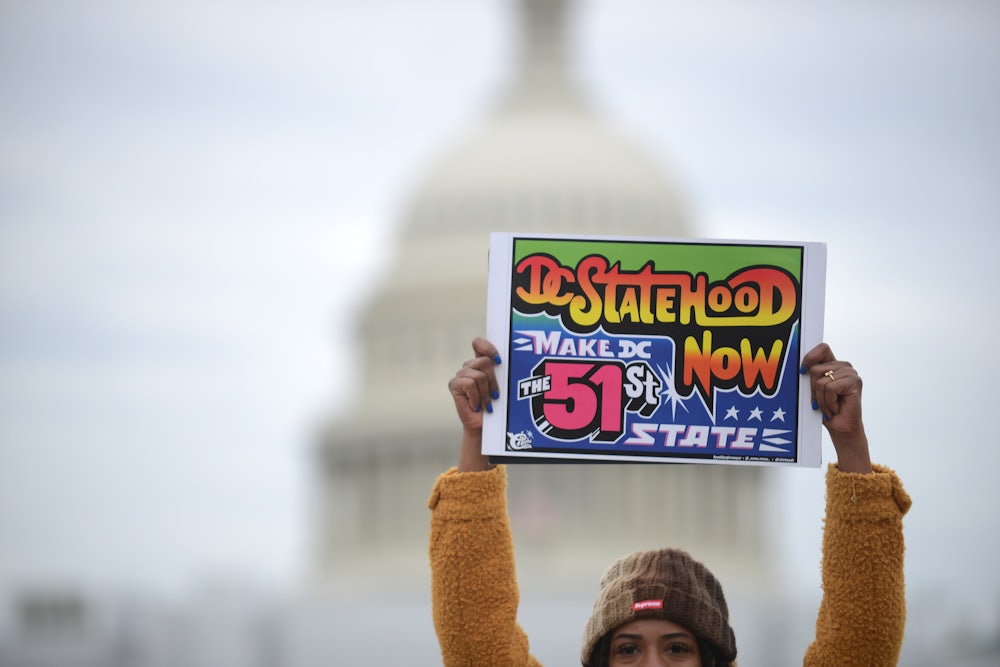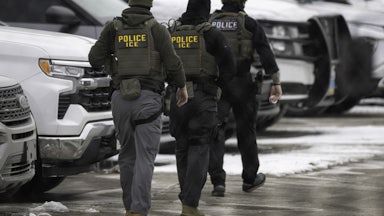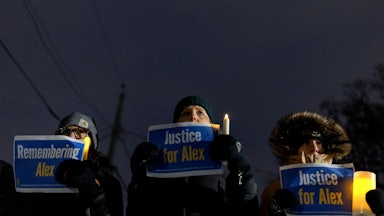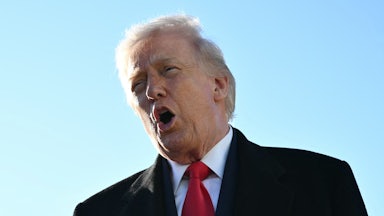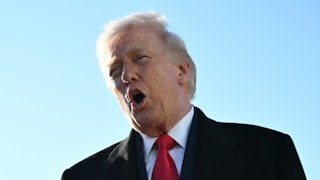Despite five decades of ostensible home rule, Congress has long intervened in the District of Columbia’s governance, using its constitutional right of jurisdiction over the nation’s capital to overturn decisions made by local officials. Federal lawmakers often use the district as a battlefield to wage political war on hot-button topics, such as abortion, marijuana, and crime. This week, congressional Republicans are turning to another red-meat issue for their base: election administration and voter fraud.
Since taking the majority in January, House GOPers have repeatedly targeted laws passed by the D.C. Council, often aided by Democrats. In March, President Joe Biden signed a bill preventing the implementation of a controversial law revising the district’s criminal code. He then vetoed a GOP bill in May attempting to block D.C.’s police accountability legislation, although the Republican effort received some Democratic votes in both chambers of Congress. On Wednesday, two House panels, the Oversight Committee and the House Administration Committee, will hold a joint hearing on “election integrity” in the district, seeking to impose new restrictions on how the city runs its elections.
Alex Dodds, the chair of D.C. for Democracy, a local grassroots advocacy group, argued that federal politicians interfered with district governance in a way they never would for another state because D.C.’s 700,000+ residents only get a single nonvoting representative in the House. “You will never have a hearing like this about the people of Oklahoma. There will never be a hearing like this about the people of Maine,” Dodds said. “Because D.C. does not have the protections of statehood and the voting representation of Congress that every other state has, it just makes us vulnerable to this type of interference.”
The hearing centers on the American Confidence in Elections Act, which includes a provision that would implement “election integrity measures” in the District of Columbia, including requiring a photo ID to vote in person or request an absentee ballot, barring same-day voter registration and automatically mailed ballots, and prohibiting collecting and returning others’ ballots, which conservatives call “ballot harvesting.” Democrats and D.C. statehood advocates argue that the bill is part of a Republican effort to functionally overturn home rule, without the input of district residents.
In an April hearing on the bill, House Administration Committee Chair Bryan Steil said it would bring “much-needed reforms in D.C. to clean up years of elections difficulties here and to clearly demonstrate the positive effects of strong election integrity policies.” In a May hearing, Steil also singled out D.C. for its new law allowing noncitizens to vote in local elections, arguing that it would leave local D.C. elections vulnerable to foreign interference; the American Confidence in Elections Act would also overturn that rule. (Four Republican members of the House Administration Committee and 16 members of the House Administration Committee, which will hold the joint hearing, voted to overturn the 2020 election results on the basis of then-President Donald Trump’s fabricated election-theft conspiracies.)
The Constitution gives Congress the authority to “exercise exclusive legislation in all cases whatsoever” over the district that comprises “the seat of government.” D.C. residents were granted the right to vote for president, along with three Electoral College votes, in 1963 with the ratification of the Twenty-third Amendment. In 1973, Congress passed the Home Rule Act, which was intended to give D.C. citizens more control over their own affairs. However, Congress reviews all legislation passed by the D.C. Council before it can become law and has authority over the district’s budget.
D.C. for Democracy and other groups, part of the “Hands Off D.C.” coalition, plan to gather ahead of the hearing on Wednesday, holding a large sign in front of the Capitol expressing their outrage over congressional interference in the district’s affairs. “The residents of the District of Columbia are the people who know our communities best. Leaders from the House have never been to our community meetings, have never spoken to D.C. residents about our concerns or what we want to see happen,” Dodds argued. “They’re really just using these hearings as an opportunity to advance their own talking points.”
The House bill in question would fundamentally change how D.C. conducts its elections. Twenty-two states and the district permit same-day voter registration. Voting by mail is also popular in the district: Nearly 64 percent of over 205,000 votes cast in 2022 were either returned by mail or voted by “special ballot,” which includes provisional ballots and votes that are submitted by drop box. (The mail-in voting system in the district is not without its issues as 17 percent of absentee ballots sent to registered voters ahead of the 2022 elections were returned as undeliverable, a much higher percentage than the national average of 1.4 percent.)
In the wake of President Donald Trump’s 2020 election loss and his false claims that he was the victim of voter fraud, GOP states passed a bevy of restrictive voting laws. Republicans argue that these efforts are intended to deter voter fraud, improve “election integrity,” and allay the fears they themselves have whipped up even as true examples of voter fraud are exceedingly rare. Some of these pieces of legislation have resulted in voters being deterred or prevented from voting. D.C.’s population is plurality Black, and it is an overwhelmingly Democratic city, and it would be unlikely to enact any of the measures that Republicans hope to impose with the American Confidence in Elections Act.
Delegate Eleanor Holmes Norton, the district’s nonvoting representative in Congress, contended that Republicans target D.C. because they can’t intervene in the governance of Democratic-controlled states. “They would like to go after Democrats, but because the district does not have statehood, it’s easier to go after D.C.,” Norton told me.
Of course, congressional Republicans were not alone in supporting recent bills to block D.C. laws. Thirty-three Senate Democrats joined all Republicans in supporting the resolution blocking the legislation revising D.C.’s criminal code, as did dozens of House Democrats.
“Through history, we have seen leadership in Congress use D.C. to elevate what they consider to be hot-button issues,” said Bo Shuff, the executive director of the advocacy organization D.C. Vote. “We’ve never seen Congress intervene in how we pave our roads, because that’s not a hot-button issue that will motivate voters.”
Explaining the principles of the bill in an opinion piece in The Hill last July, former Representative Rodney Davis, who originally introduced it, noted that because “the Constitution gives Congress responsibility over the District of Columbia,” his bill was intended to “implement best practices” for election governance in the district. “A lot of false narratives on the left will quickly be debunked when commonsense measures like requiring a photo ID are implemented in such a liberal area with no negative impacts on turnout or effects in the outcome,” Davis wrote. (Davis did not raise objections to the Electoral College certifying Biden’s win.)
For D.C. statehood advocates, Wednesday’s hearing only demonstrates why the district deserves full representation. “It’s the only national capital on Earth whose residents are disenfranchised in their national legislature,” said Representative Jamie Raskin, the ranking member of the House Oversight Committee. “And instead of talking about that, the Republicans have the audacity to lecture the people of D.C. about election integrity.”
